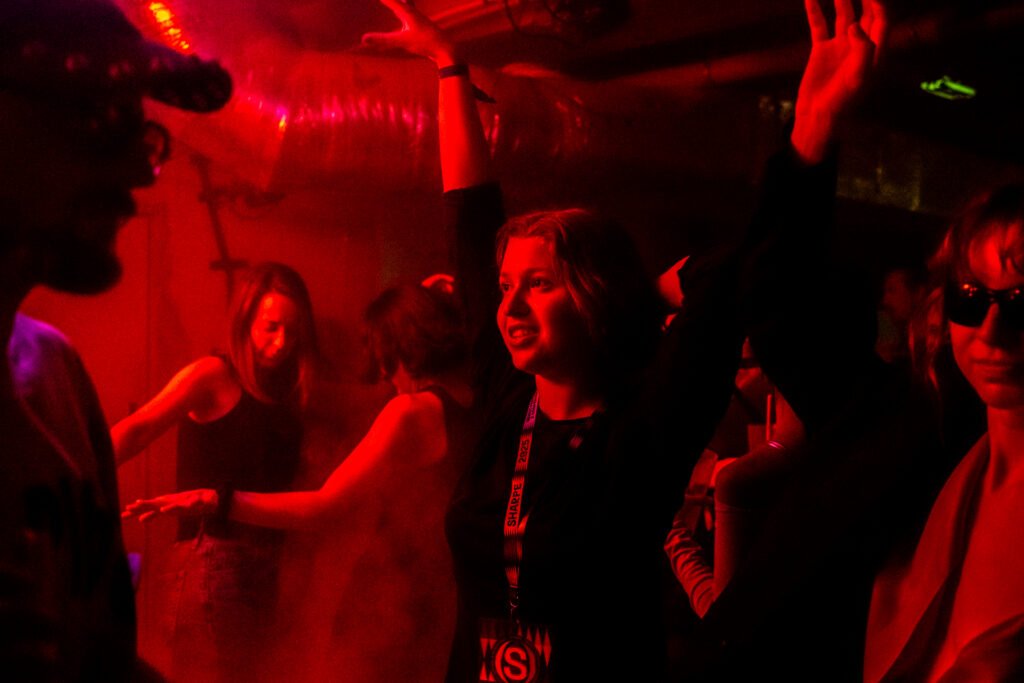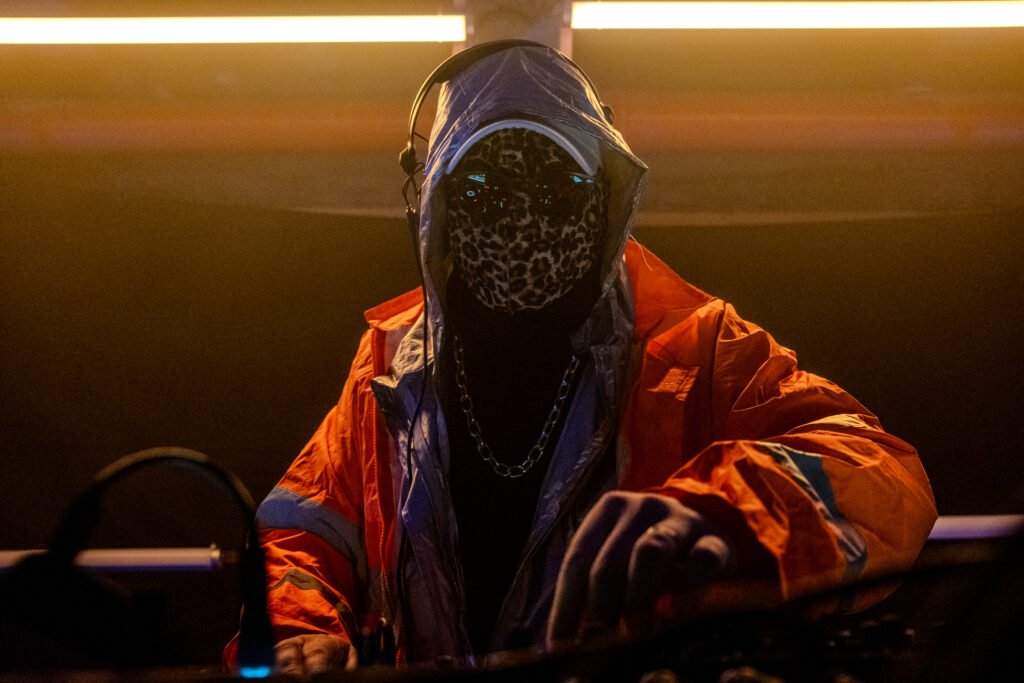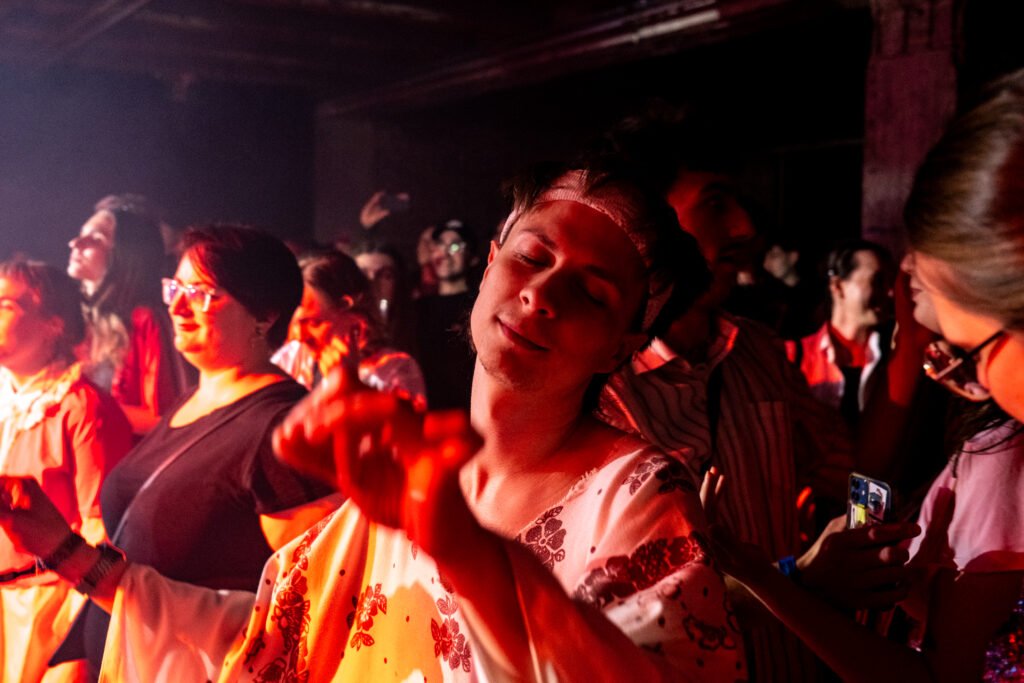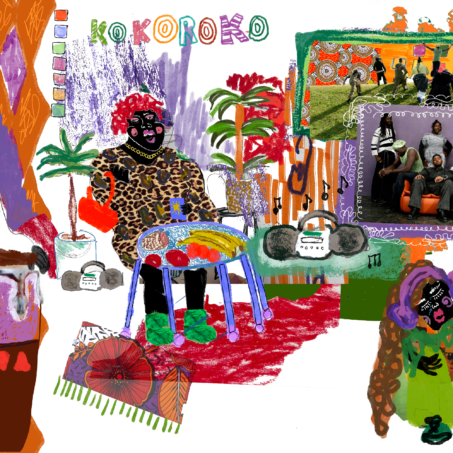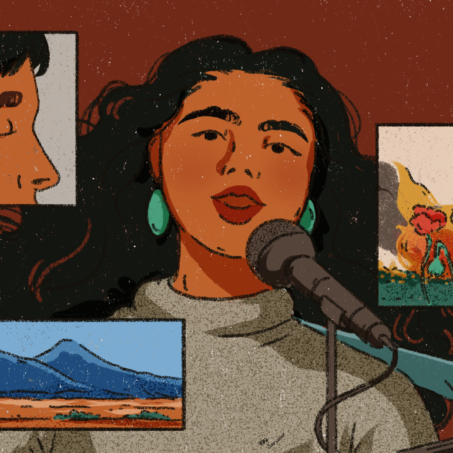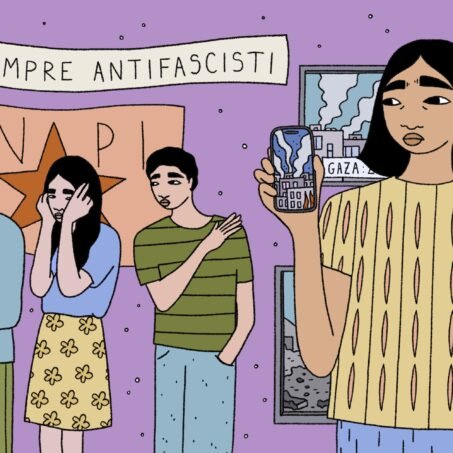There is a phrase that has reverberated for decades in the discourse of many Slovaks: islands of positive deviation. It’s a clunky term that stuck some time around the Velvet Revolution 36 years ago, initially used to describe pockets of nonconformity and resistance to the communist regime.
Something about its abstract imagery caught my attention on an afternoon back in January when my friend, Tatiana Lehocka, ruminated on the worrying trajectory of politics back home in Slovakia. For her and her colleagues at SHARPE, the festival they run in the capital Bratislava, the phrase had become a symbol of hope, somewhere to anchor amid a moving tide towards authoritarianism under populist Prime Minister Robert Fico.
The renewed spirit of positive deviation captivated me, but also highlighted a knowledge gap. In the UK we hear a lot about the rise of the far-right in Europe, and even of the populist, illiberal tendencies of Hungary and, until recently, Poland. But in this pair’s smaller neighbour, a similar story is underway which threatens to slash grassroots culture and free expression.
So, at the end of April I travelled to Bratislava to go to SHARPE, speaking to several cultural stakeholders: the festival’s Creative Director Michal Berezňák; Adam Dragun, a young theatrician and singer in the band Berlin Manson; and Andrej Gregorčok, a representative from Otvorená Kultúra!, a non-partisan group formed to call for Šimkovičová’s resignation while rallying a unified, cross-cultural network. With their help, I hoped to use the festival as an entry point to examine the wider socio-political backdrop of Slovakia today.
“Slovak and no other”
It’s a Saturday evening in the northern outskirts of Bratislava and local band Berlin Manson has taken to the stage. There is a vibe in the air that flirts between menacing and joyous as the trio play serrated post-punk with thumping, industrial drums and brooding guitars, while frontman Adam Dragun jumps into the crowd to spit lyrics about making love in a housing crisis (“Kde Budeme Bývať?”) and police who beat unhoused men to death (“Polámeme svoje ID?”)
I don’t speak Slovak, but the ire and bite in Dragun’s tirades between songs feels tangible.
Not long ago, Berlin Manson hired private security for a show in the capital after receiving death threats for their outspoken political stance, but tonight they feel safe. They are one of the most anticipated bands performing at SHARPE, which, though unassuming among the grey, monolithic relics of the city’s old chemical district, is providing a space of community amid Fico’s culture war.
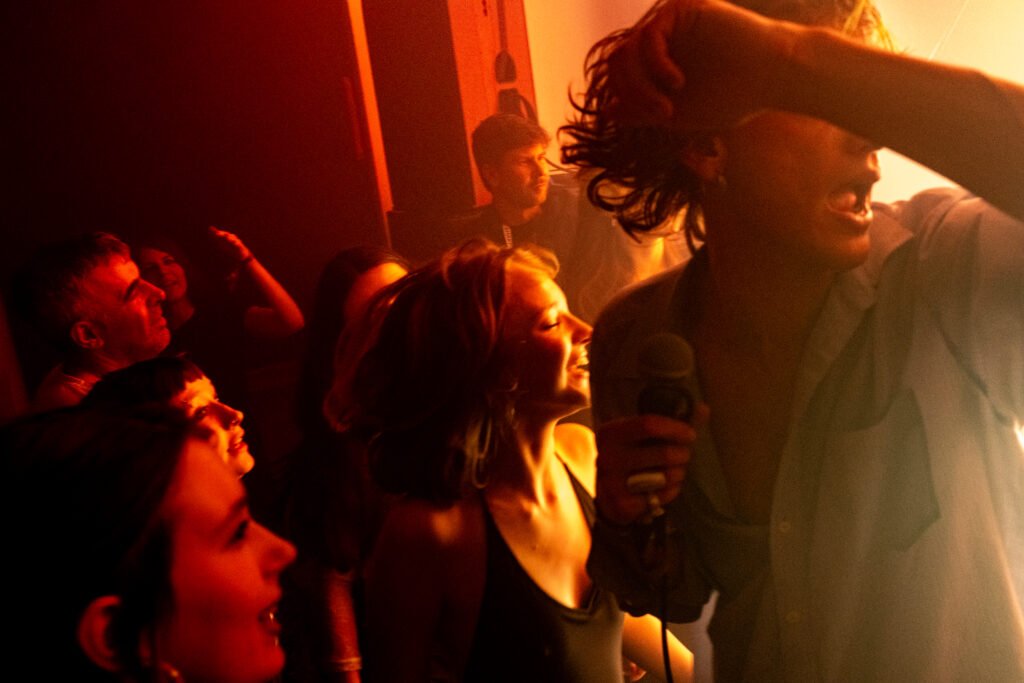
Held each spring among the converted classrooms and dark cellars of Nová Cvernovka, an old high school turned arts hub that radiates a feeling of welcomeness, SHARPE spotlights the best of Slovakia’s underground scene, alongside artists from its European neighbours. Being at the festival’s seventh edition feels like attending a city festival in almost any other European country, where live music and escapism obscure wider worries.
Pride and Ukraine flags ripple in the breeze behind a bar selling cheap beer and Borovička – a traditional Slovak gin-like spirit that takes some getting used to. In the afternoons, panellists discuss topics such as the financial realities of modern touring or the increasing use of AI in the music industry. Come evening, the feedback of guitars and crashing of cymbals bleed out into the corridors, while wooden chairs creak in the hush of a library room as a selection of artists play stripped back, ‘secret’ sessions.
It’s a meeting of sounds, ideas and cultures that places SHARPE amid a network of similar so-called showcase festivals around the continent that celebrate these types of exchanges. But looming socio-political tensions in Slovakia have made this kind of event become quietly, but increasingly, charged; perhaps this context is most potently understood by the declaration made by Culture Minister Martina Šimkovičová on the day of her appointment in October 2023: “The culture of the Slovak people should be Slovak, Slovak and no other.”
Corruption and culture wars
I first heard about Slovakia’s political crossroads outside a nightclub in Estonia in April 2024. In the queue for Tallinn’s techno institution HALL, I met a young couple who worked for SHARPE. As we edged closer to the doors, they explained that though they were excited to get in, they would only have a few hours before having to leave to fly to Bratislavato vote in the presidential elections. I was struck by their determination – to party and to vote – but they explained that there was a lot at stake.
Peter Pellegrini became Slovakia’s President on 15th June 2024, and though his victory added a final layer of consolidation for Fico’s coalition, the Prime Minister had hardly been subtle about an agenda that has increasingly reflected the illiberal and Eurosceptic playbook of Viktor Orban in neighbouring Hungary.
When Fico took to office for the fourth time and his coalition – two parts social democratic and one part ultranationalist – was sworn in on 25th October 2023, he immediately replaced senior police officials and soon after disbanded the special prosecutor’s office that had been investigating high level corruption cases.
Earlier this year, a report by Transparency International showed that in 2024 Slovakia dropped to 59 on the Corruption Perceptions Index, 12 places below its spot the previous year. This move was incendiary, given Fico’s resignation in 2018 following the murder of 27-year-old journalist Jan Kuciak, who had been working on a story connecting senior government advisors to an Italian mafia group. His suspicious death, and that of his fiancé Martina Kušnírová, sparked the biggest protests in the country since the Velvet Revolution; seven years on, #AllForJan posters are still plastered throughout the capital.
Many believe that in his latest term in office, Fico is using a culture war to obfuscate evidence of corruption while peddling an increasingly intolerant and nationalistic order. Speaking in an interview for Early Warning, an April 2025 report by the Artistic Freedom Initiative and Otvorená Kultúra!, the visual artist Ilona Németh argues that the exact goal of Slovakia’s current cultural politics is unclear. “It’s about money, destruction of the structures,” she says, “and providing smoke to cover the government’s other priorities – like dismantling the justice system or getting corrupt politicians out of detention on remand.”
All of this began with the immediate appointment of Šimkovičová as culture minister. Formally a news anchor with no experience running cultural institutions and who once claimed that Europe and the white race was “dying out” because of the LGBTQIA+ community, Šimkovičová cut funding for events such as Rainbow PRIDE, while beginning a purge of highly respected directors of institutions such as the Slovak National Theatre and Slovak National Gallery. Most alarmingly, in April 2024, the independent Radio and Television of Slovakia (RTVS) was dissolved and replaced with a new broadcaster, Slovak Television and Radio (STVR), effectively swapping editorial independence with a state-run media.
Explicit and implicit protest
Šimkovičová’s reforms are affecting Slovak arts from a grassroots to national level, making any event or group at odds with her politics seemingly an act of rebellion. But SHARPE was never intended to be an explicit protest. “From the beginning,” says Creative Director Michal Berezňák, “our aim has been to create a space that reflects an open, curious, and international cultural scene. The fact that this now feels political says a lot about where we are.”
I doubt anyone is worrying about a democratic recession when Irish rapper Celaviedmai drops multilingual bars over uptempo, genre-blending party tunes. Nor when Berlin-based Kara Delik drifts from hefty post-punk to locked in, Anatolian grooves at the swish of a saz – an electrified, long-necked lute. Certainly not when Bali G & Rhuby Wax of local collective Fractal Disco spins funky tech late into Saturday morning. If it crosses anyone’s mind before Swedish outfit The Family Men take to the stage, it would quickly shatter once their bone crunching sound kicks off.
This is not to say that attendees aren’t contemplating or acting on these issues elsewhere. Back in the centre of Bratislava, people regularly protest in their tens of thousands in Freedom Square or outside the Ministry of Culture. Just a few days after SHARPE, festival crew members join crowds gathering outside the Slovak National Theatre, exhibiting photos of bombed Ukrainian cities to protest the booking of Russian soprano and Putin ally Anna Netrebko. Coordinating such protests is Otvorená Kultúra! (OK!)
For OK! it is important that demonstrations are large and frequent during what the group calls the “normalisation phase,” when the first signs of authoritarianism begin to appear legitimate or commonplace.

Join our mailing list
Sign up for shado's picks of the week! Dropping in your inbox every Friday, we share news from inside shado + out, plus job listings, event recommendations and actions ✊
Sign up for shado's picks of the week! Dropping in your inbox every Friday, we share news from inside shado + out, plus job listings, event recommendations and actions ✊
“This phase is still ongoing,” explains OK!’s Andrej Gregorčok, “and we are doing everything we can to resist it. The positive side is that the cultural community in Slovakia has never been as united and cohesive as it is now. This unity spans the entire cultural spectrum – from folklore to contemporary art, and from dance, theatre, film, and music to visual arts, publishing and heritage protection. The level of destruction in the cultural sector is so profound that all disciplines are now actively collaborating and seeking ways to reverse the current situation.”
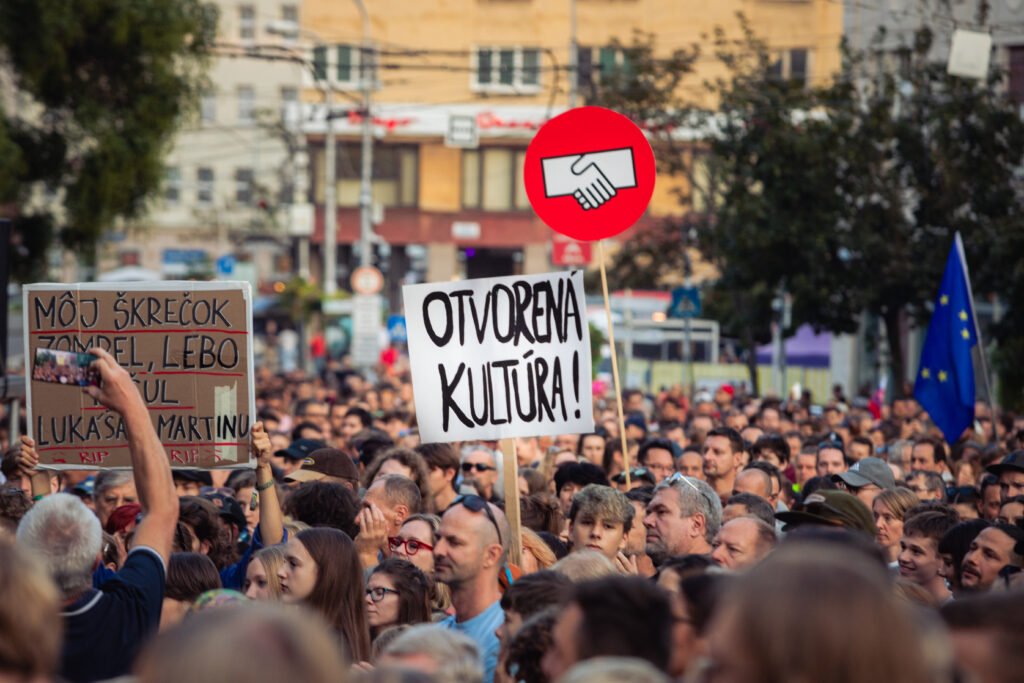
At the end of May, OK! invited cultural organisations from 17 European countries to Bratislava for a conference, resulting in the Bratislava Declaration for Artistic Freedom – a call to action to the European Parliament to provide “systemic protection of artistic expression, creative freedom, and the independence of cultural institutions across all member states.”
Aligned but apart from these concurrent protests, it feels right that SHARPE can provide a space for Slovaks to continue celebrating free and multicultural expression without any explicit socio-political context overshadowing it. But perhaps it is able to do so because, for now at least, there is a feeling that tightening the grasp on other areas of cultural expression remains the priority.
In the sepia-toned corridors of the Slovak Radio Building, an upside-down pyramidic feat of socialist modernism home to the public Radio_FM channel, and once bizarrely named one of the world’s ugliest buildings by The Telegraph, it all feels like business as usual. Channel execs are free to play what they want so long as 35% of the air waves remains Slovak, with language quotas not uncommon on the continent: France, for example, has the same requirement.
But it’s telling that only recently, Radio_FM’s alternative music awards ceremony Radio_Head Awards was not televised or live-streamed for the first time; Šimkovičová knows many artists would use the occasion as a platform. Likewise, in April, the annual Slovak cinema and television film awards Slnko v sieti was also not broadcast for the first time in its history, after its organisers, The Slovak Film and Television Academy, could not guarantee acceptance speeches would remain apolitical.
“The new politicised STVR board is now proceeding in accordance with the plan to take complete control of the situation in both television and radio,” says Andrej. “We fear that progressive stations will have big difficulties in the coming weeks to survive under their control.”
SHARPE is not without its present pressures, too. This recent edition marked the final round of a three-year funding contract from the Slovak Arts Council, an organisation that has been, until recently, proudly independent and expert-led. Legislative amendments have allowed Šimkovičová to replace these experts with ministerial appointments, effectively handing over control of where the arts budget is dispersed going forward. Just days after the festival, the council’s Director of Funds, Robert Špoták, a respected figure among the professional arts sector and underground alike, was ousted. Small showcase festivals such as SHARPE rely heavily on government funding, especially as the state of the global economy tightens the purse strings of brand sponsorship deals, putting its future up in the air.
Cultural infrastructure at risk
While never intending to be a space of protest, there are a few moments where SHARPE seems to speak up for itself, most galvanised during Berlin Manson’s impassioned set. Later on, over a coffee, Dragun acknowledges the knock-on effect the reshaping of the Slovak Arts Council will have on music venues, particularly in regional suburbs, but has faith in the framework of live music.
His concerns fall more on the wider, long-term effects that increasing polarisation and extremisation will have on a healthy cultural ecosystem, fearing a decline in programmes focussed on human rights and international exchange. “In many ways, I am a product of this European idea,” he tells me. “Exchanging thoughts, meeting people internationally and building a critical cultural infrastructure.”
He continues: “Sure, there will always be a punk scene – it’s strong and, in a morally neutral sense, very populist. But counterculture without an intellectual foundation is fragile. Maybe this idea of a young European cosmopolitan person travelling up and down across Europe isn’t ideal and is, in many ways, exclusive, but we must never abandon the idea of a leftist, local, grassroots counterculture that’s connected to both international and intellectual dimensions.”
Particularly for the Brexit generation back at home, it can be tempting to conflate Euroscepticism as inherently far-right or ultra-nationalistic, when of course the subject is more nuanced than that. Dragun’s point here seems to hint at a similar sense of bias or privilege belonging to those who have only known EU membership in their lifetime – Slovakia joined in 2004 – and which may undermine domestic concerns or even a sense of national pride. But this take is not niche or exclusive; this year has seen crowds in their thousands march on an almost weekly basis under the banner ‘Slovakia is Europe’, while POLITICO’s Poll of Polls shows that the pro-European Progressive Slovakia party have beaten Fico’s Smer-SD party in voting intention throughout the whole of 2025.
In this light, SHARPE seems to embody a space for people like Dragun and peers who consider the strength of Slovak’s grassroots culture to be intrinsically entwined with the rest of its neighbours; for them, Fico’s ultra-nationalistic trajectory simultaneously increases the divide among themselves and with the rest of the West.
An island of positive deviation
On a subtler level, the booking of Tbilisi-based DJ Ana Marjanidze, known as 3AM, also feels significant. Ana has been an outspoken voice against Georgia’s own ongoing repressions that have muddled democratic freedoms and moved the country towards a Russian style governance, and during a panel discussion entitled Songs of Resistance, she tells anecdotes of techno fans protesting nationalist extremists in her hometown.
While 3AM’s heady, warbling minimal tech set cannot vocalise this per se, her presence itself is symbolic of the kind of unity that OK! and the other signatories of the Bratislava Declaration for Artistic Freedom seek to put into legislative action.
Presence seems to be the operative word for SHARPE, in spite and in quiet defiance of the pressures that threaten it. “We don’t carry banners or chant slogans,” reflects Michal, “but we do insist on continuing – on staying open, connected and forward-thinking. In the current climate, where culture is being politicised and reduced to narrow nationalist narratives, that in itself becomes an act of resistance. I see SHARPE as a place where we protect a bit of freedom, imagination and future. We don’t protest by stopping. We protest by continuing.”
At SHARPE, in its talks, performances and in its audiences, I see a life-affirming array of exchanges in defiance of Šimkovičová’s “Slovak and no other” mantra. Like those islands of positive deviation from the not too distant past, I hope that SHARPE can continue to provide a place to cultivate and keep countercultural practices alive in Slovakia.
What can you do?
- Listen to Early Warning: The Politicization of Slovak Arts and Culture podcast from the Artistic Freedom Initiative and Otvorená Kultúra!
- Or, read the full report here
- Read The Bratislava Convention, and join organisations such as Culture Action Europe and Trans Europe Halles by signing it
- Read ‘The Autocrat’s Handbook: How Slovak democracy is transforming into autocracy’by Yelizaveta Landenberger on the Diasporist.
- Read ‘In Slovakia, a frenzy of cultural repression is under way, as we turn back to Soviet times’ by Monika Kompaníková for The Guardian.
- Read ‘Slovakia and the future of Europe’ by John Chin and Daniel Hayase at The Loop.
- Follow SHARPE Festival here
